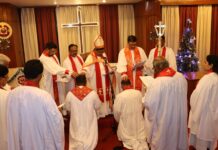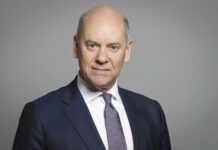Meetings of the Anglican Church’s Appellate Tribunal (Australian Anglicanism’s version of the High Court) are under way to determine whether civil same-sex marriages can be blessed in church.
The tribunal may deliver a verdict as early as September or October in a case which pits “conservatives” versus “liberals” in a church with a wide range of beliefs.
The Anglican Church of Australia’s General Synod (church parliament) has voted repeatedly to have a traditional view of marriage. But last year the Wangaratta diocese (region) voted to bless same-sex marriage in churches, a move strongly supported by its Bishop (leader) John Parkes.2 OCT 2019 10:19AM
The tribunal has been asked to determine whether the regulation to allow blessings passed by Wangaratta Synod is consistent with the constitution of the Anglican Church of Australia.
Bishop Parkes intended to bless the civil (not performed by the church) marriage of John Davis and Rob Whalley – two priests in his diocese – a few weeks after the vote. But the matter was referred to the Appellate Tribunal by the then Primate (national leader) Archbishop Phillip Freier of Melbourne.
One controversy about the Tribunal is that one of its two members from Wangaratta, Justice Clyde Croft, has not recused himself. “Croft took no part in the deliberations of the Wangaratta Synod [the meeting which voted to bless same-sex marriages],” Bill Condie, the spokesperson for the new Primate, Geoffrey Smith of Adelaide, told Eternity.
Croft is a Trials Division justice at the Supreme Court of Victoria. The office of Chancellor of an Anglican diocese is usually held by a Judge or a senior counsel and a number of them sit on the Appellate Tribunal.
The other Wangaratta member of the Tribunal, Bishop John Parkes, went on long service leave after the diocese laid down a challenge to the national church. Parkes has since retired. He told the ABC last year: “I have sat with the tensions of the church for many years. I have decided that now is the time that I have to act in conscience, to do what I believe to be right.”
The decision of the Tribunal – whichever way it determines the Wangaratta case – will raise the temperature of the long-running dispute over same-sex marriage within the Anglican Church of Australia. Conservatives have the numbers in the General Synod, and an overwhelming vote in the Melbourne diocese in favour of a conservative nation would indicate that the conservative voice is growing.
As reported previously by Eternity, a conservative approach (as articulated by Archbishop Glenn Davies of Sydney) is “my own view is that if people wish to change the doctrine of our Church, they should start a new church …”
Bishop Steven Pickard, from the left, cited the US theologian Diana Butler Bass in arguing for a shared space – “the commons” – where Christians could “gather beyond their own silos of certainty and clarity”.
If the Tribunal rules that blessing same-sex marriages contracted civilly is ultra vires (against) the Anglican Church constitution, as Pickard suggests, the left will simply stay in a church with its newly affirmed conservative views. There will be acts of rebellion. Same sex priests will stay in places such as Brisbane, with civil marriages unblessed.
If the Tribunal rules that same-sex marriage is consistent with the Anglican Church constitution, and therefore permitted, the conservatives “may do a GAFCON”. This will mean that many (not all) conservatives will simply not take part in the national church any longer. Conservative diocese such as Sydney, New England and North West Australia have boycotted the structures of the worldwide Anglican Communion, and have formed a conservative network – taking part in Global Anglican Futures Conference (GAFCON).
If that happened, conservatives may form parallel structures in some more liberal dioceses. For example, in parts of Australia such as Newcastle in NSW, the Fellowship of Independent Evangelical Churches provides an alternative to liberal dioceses while not being Anglican. In some places, conservative networks are effectively “semi-detached” from their diocese – Adelaide’s Trinity Church Network is an example of this approach.










